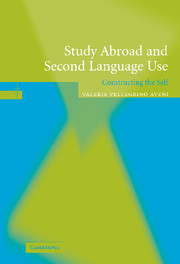Book contents
- Frontmatter
- Contents
- Acknowledgments
- Note on text conventions
- Abbreviations
- Introduction
- 1 Language use in a social context
- 2 The social dance: second language use and the construction of self
- 3 Learners and their environment: factors affecting self-construction
- 4 Coming into our own: the convergence of real self and ideal self
- Conclusion: The self in the second language: implications and next steps
- Appendix 1 Study context and research methodology
- Appendix 2 ACTR study-abroad program participants: 1995–1996 demographic profile
- Appendix 3 Participant profiles
- References
- Index
3 - Learners and their environment: factors affecting self-construction
Published online by Cambridge University Press: 06 January 2010
- Frontmatter
- Contents
- Acknowledgments
- Note on text conventions
- Abbreviations
- Introduction
- 1 Language use in a social context
- 2 The social dance: second language use and the construction of self
- 3 Learners and their environment: factors affecting self-construction
- 4 Coming into our own: the convergence of real self and ideal self
- Conclusion: The self in the second language: implications and next steps
- Appendix 1 Study context and research methodology
- Appendix 2 ACTR study-abroad program participants: 1995–1996 demographic profile
- Appendix 3 Participant profiles
- References
- Index
Summary
I get uncomfortable … because she really thinks I'm a child with no thoughts and no intelligence. If she doesn't feel that way then I don't know why she treats me that way. So it makes me very ill at ease to just sit there and smile and nod.
Susan, Fall SemesterI was inclined to speak more not only because I was interested, but because I got the feeling I impressed them a little with my Russian. That was an ego boost I needed.
Julie, Fall SemesterAs social actors in the intercultural arena, language learners are constantly engaged in an open performance of a rather personal act – the construction of the self. Self-construction in the foreign society is, in fact, a carefully orchestrated spectacle. As in any performance, the actor plays to an audience. The spectators express mixed reactions – some playing the critic, displaying frowns, laughter, and, at times, outright insults, while others act as the undying fans, proud of the actor and ready to support all offerings. The actor looks to the audience as a measure of his or her performance, hoping to understand through critics and fans the picture he or she is publicly presenting. Yet the greatest critic is the individual performer, who observes himself or herself from all angles and ultimately decides whether the performance has been a success. Was the self created and portrayed the desired one, or was the individual perceived by the audience to be one of lesser quality?
- Type
- Chapter
- Information
- Study Abroad and Second Language UseConstructing the Self, pp. 54 - 112Publisher: Cambridge University PressPrint publication year: 2005



